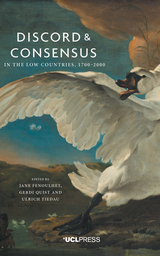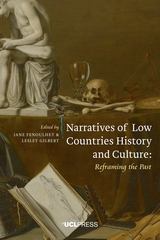3 books by Fenoulhet, Jane

Discord and Consensus in the Low Countries, 1700-2000
Edited by Jane Fenoulhet, Gerdi Quist, and Ulrich Tiedau
University College London, 2016
All countries, regions and institutions are ultimately built on a degree of consensus, on a collective commitment to a concept, belief or value system. This consensus is continuously rephrased and reinvented through a narrative of cohesion and challenged by expressions of discontent and discord. The history of the Low Countries is characterised by both a striving for consensus and eruptions of discord, both internally and from external challenges. This interdisciplinary volume explores consensus and discord in a Low Countries context along broad cultural, linguistic and historical lines. Disciplines represented include early-modern and contemporary history; art history; film; literature; and translation scholars from both the Low Countries and beyond.
[more]

Eva
A Novel
Jane Fenoulhet
University College London, 2019
“I let these years slip through my fingers like a stream of dry, glinting sand.” Eva is a coming-of-age story told in fluid, stream-of-consciousness prose that takes readers through the eponymous main character’s orthodox Jewish girlhood to marriage to, finally, independence and sexual freedom. Originally published in 1927 by Dutch writer Carry van Bruggen (1881–1932), the experimental novel expresses Eva’s dawning sense of self and expanding subjectivity. Burdened all of her life by feelings of shame, Eva overcomes this legacy of her upbringing at the end of the novel and declares that it is “bodily desire that makes love acceptable.”
For the first time, Jane Fenoulhet has made this important, modernist novel accessible to English-language readers, her deft translation capturing the rich expressiveness of van Bruggen’s original Dutch. In insightful accompanying commentary, Fenoulhet describes how, just as the novel depicts the becoming of both Eva and her creator, so too can the translation be seen as the translator’s own becoming. Fenoulhet also describes the challenges of translating van Bruggen’s dynamic, intense narrative, which necessitated deep personal engagement with the novel.
For the first time, Jane Fenoulhet has made this important, modernist novel accessible to English-language readers, her deft translation capturing the rich expressiveness of van Bruggen’s original Dutch. In insightful accompanying commentary, Fenoulhet describes how, just as the novel depicts the becoming of both Eva and her creator, so too can the translation be seen as the translator’s own becoming. Fenoulhet also describes the challenges of translating van Bruggen’s dynamic, intense narrative, which necessitated deep personal engagement with the novel.
[more]

Narratives of Low Countries History and Culture
Reframing the Past
Edited by Jane Fenoulhet and Lesley Gilbert
University College London, 2016
This edited collection explores the ways in which our understanding of the past in Dutch history and culture can be rethought to consider not only how it forms part of the present but how it can relate also to the future. Divided into three parts – The Uses of Myth and History, The Past as Illumination of Cultural Context, and Historiography in Focus – this book seeks to demonstrate the importance of the past by investigating the transmission of culture and its transformations. It reflects on the history of historiography and looks critically at the products of the historiographic process, such as Dutch and Afrikaans literary history. The chapters cover a range of disciplines and approaches: some authors offer a broad view of a particular period, such as Jonathan Israel's contribution on myth and history in the ideological politics of the Dutch Golden Age, while others zoom in on specific genres, texts or historical moments, such as Benjamin Schmidt’s study of the doolhof, a word that today means ‘labyrinth’ but once described a 17th-century educational amusement park. This volume, enlightening and home to multiple paths of enquiry leading in different directions, is an excellent example of what a past-present doolhof might look like.
[more]
READERS
Browse our collection.
PUBLISHERS
See BiblioVault's publisher services.
STUDENT SERVICES
Files for college accessibility offices.
UChicago Accessibility Resources
home | accessibility | search | about | contact us
BiblioVault ® 2001 - 2024
The University of Chicago Press









